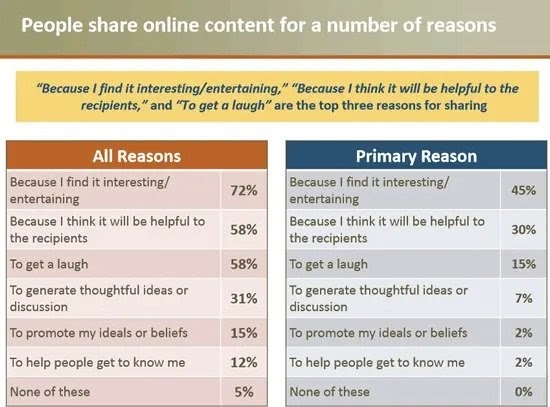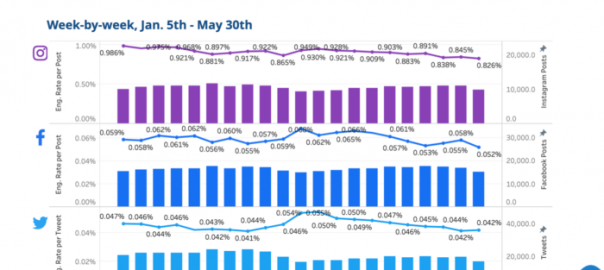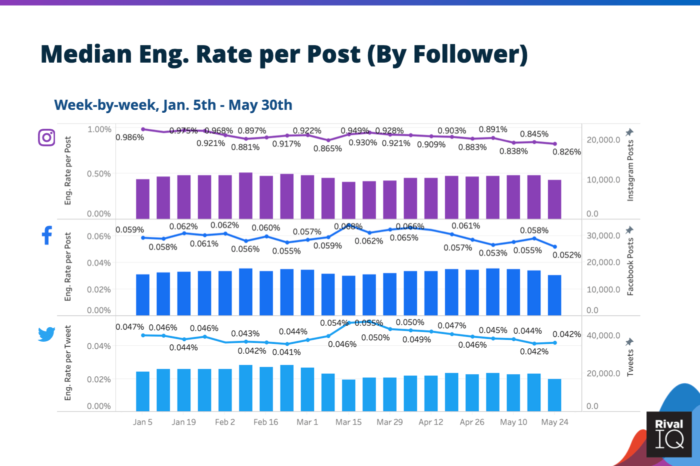We’re told time and time again, producing high quality content is one of the highest value activities you can do for your business. Yet, the question remains, what does high quality content actually mean and how do you measure it?
With content marketing, it can be easy to get lost in the noise and miss what matters. For this article, let’s consider just two metrics—an engagement metric—social shares and an SEO metric—keyword rank.
Shares are often considered a ‘vanity metric’ in the sense they don’t always directly help a business generate more revenue.
But shares are also significant in the fact that it shows that someone found your content valuable enough to share. Being mentioned by an industry thought leader can put your brand or business on the map for example.
On the other hand, optimizing your content for ranking takes time to start seeing results and can and it can be challenging to outrank your competition.
In an ideal world, your content would rank well and get lots of social shares. But given marketers are often limited on time and resources, which should you prioritize if you have to choose? I asked 18 digital marketing experts and content creators to find out.
But first the pros and cons of each approach.
Pros and cons of Shared Content Optimization (SCO)
Pros
- A share is a leading indicator that your audience found the piece of content valuable enough to share. The more shares a piece of content gets, the higher the chance of it ‘going viral.
- A share also suggests your reader agrees with or finds your content though-provoking. 45 percent of US adults shared an opinion piece they agreed with on social media.
- Content that gets shared, also generally suggests the content was interesting, fun, or even just engaging. This can often signal you’re creating content that connects with your readers and target audience.

- Shared content is immediately public material and can lead to an immediate bump in traffic.
- Oftentimes, shared content includes commentary or other additional insight you can use to gain audience insights and leverage user generated content (UGC).
Cons
- Not all shares are created equal, and shares can often be misleading. It’s often difficult to measure the true ROI from social shares directly.
- 6 in 10 people only read headlines before sharing, this means that quantity of shares may not always reflect content value.
- Organic reach for many social media platforms is declining, making it more difficult for content to get seen organically.
- Social media is subject to changes in algorithms, updates and features. These affect content visibility and are many times out businesses control.
- Social media posts are time-sensitive. For example, you have to post at a certain period to get maximum engagement. Generally posts have a short shelf life.
Search Engine Optimization (SEO)
Pros
- With well ranking content you’ll generally continue to see ROI for a long period of time.
- When you rank for buyer intent or longer tail keywords, you attract people who potentially need the kind of solution or information you provide.
- Ranking high in search gives you more credibility amongst searchers. 71% of search engine users don’t click past the first page of search results.
- The process of keyword research for SEO alone, can help you understand what your audience wants.
Cons
- It is difficult to achieve first page rank with new websites or fresh content. Old pages (sometimes with subpar content) often outrank fresh pages. In this way, ranking highly may not reflect content value.
- Google constantly changes its algorithms which requires you to keep up with the changes.
- It can be quite difficult to determine the ROI of your SEO efforts in the beginning as rankings take time to settle (up to 6 months).
- Depending on your industry, it can be difficult to rank due to competition.
Now that we’ve gone over the pros and cons of both SEO and SCO let’s look at what the marketing experts have to say.
According to the Experts:
The best metric is EPV (earnings per visitor) > CPV (cost per visitor). This means you are driving traffic at profit. Shares and rank are vanity. You can have both and still make no profit.
– Chris Von Wilpert, Owner, ContentMavericks
“Shares = meh. Ranking is only good up to a point, but it’s important when we add new features (to get listed quickly with new pages.”
-Benjamin Thomas, Content director, User.com
Picking a metric to focus on is the whole problem with measuring content marketing impact. The premise is flawed. Different pieces should have different objectives. The same piece can have multiple objectives. And depending on where in the buyer’s journey the potential customer is with the content, a metric that is a perfect fit for measurement elsewhere could be completely useless and inappropriate.
Instead of arguing over rankings vs. shares, we ought to be arguing for a more holistic and inclusive way of evaluating content performance. Doing anything else doesn’t do anyone any favors.
– Joel Klettke, Founder, CaseStudyBuddy
“Comments and replies I think constitute more than anything else, that people are interested in what you created. It has to be interesting enough to capture their attention and evoke a genuine response. Of course, that can be manipulated in all kinds of sneaky ways, and is, but it’s the content that offers some kind of true value that works best. It’s a long game. Unfortunately, most content creators play a short game, they want results now, and it encourages a blinkered approach. They play to people’s emotions deliberately and inflame passions for the sake of numbers. That’s a real shame I think”.
-Larry G. Maguire, larrygmaguire.com
I would argue that the most qualitative metric for effective content in 2021 is the number of subscribers/followers the content generates. Other metrics are also important but don’t meet the main objective, which in most cases is to gain a constantly growing following that will consume your content on a consistent basis
-Oleg Donets, Founder, ODMSoft and Real Estate Bees
“I’d say “Leads” if not “Sales”. But these tend to be difficult to measure, with content often not being the last thing folks click before they end up buying.
Other than that, it’s got to be a mix. You can rig the game and play with these metrics if you want, by creating viral content or one that’s super searched for…but has nothing to do with your business. So in my opinion, it’s got to be a mix.”
-Michal Leszczynski, Content director, Getresponse
For us it’s the amount of free trials the blog drives. We care about bottom-lines, not vanity metrics.
Trina Moitra, Head of Marketing, Convert.com
“For every piece of content I publish—for ourselves or for our clients—I have a specific objective the piece fulfills and set my content marketing KPIs accordingly. For our content marketing agency, our content strategy focuses on connecting with marketers and startup founders who need help drafting or implementing a content strategy. With that in mind, we love it when a blog post ranks well in search and sees a good amount of traffic. But having social shares, and seeing reader comments, is often a better indicator that we are reaching our intended recipient.”
-Erika Heald, Erika Heald Marketing Consulting
The short answer: it depends
If I had to choose, I’d lean towards rank, as that in my opinion, would have the biggest upside. That said, getting shares early and often, especially when you’re just building your content marketing strategy, can help put you on the map and lead to links, which will ultimately help you rank higher in the future. Certainly, shares can be useful for vanity/generating excitement, but ranking is where it’s at for me.
CXL’s very own content lead, Bud Hennekes
Measuring the success of content depends on the goals of that content. Sometimes the goal will be engagement, making shares and likes the best metrics to track. Other times, the goal will be to increase site traffic, making rankings the most effective metric. Your goals should inform your content decisions and each goal will determine the most effective metric to measure success.
Amy Balliett, Founder, Killer Visual Communications
“You should focus on leads or revenue. You can’t bank shares or rankings.”
-Eric Schwartzman, Ericschwartzman.com
I would say conversions. While content marketing is not directly intended to make sales, there is often a desired conversion involved. That could be readers signing up for an email list or even making a purchase.
Emily Krings, Owner, Quill to Keys content writing.
“There are many metrics to consider when measuring successful content, but it depends on the type of content you’re creating. So marketers need to align different goals with different types of content. But the two metrics that tend to remain stable across all formats are: where your content is placed and how useful your audience feels your content is.
The former is fairly straightforward, in that it shows how well you have optimized your piece for the right keywords. But the latter is complicated. Here you’re not only looking at actions, but also how long your audience stays on your site, for example, to consume the content or how they interact with it (do they click through to another page for more information? leave a comment? ask questions? etc).
I would definitely say it’s the rank and the relevancy of your content to your audience at different stages of their lifecycle with your business/brand that matters when measuring success.
And there’s no one metric fits all approach, because everyone’s creating content to reach different goals. So the measurability aspect, the onus is on the marketers to clearly define the goals in their strategies.”
-Vanhishikha Bhargava, Founder, Contensify
For me it’s rank, because if a post ranks it has longevity. Shares are amazing to drive traffic and leads in the short term, but the shares will dwindle and so will the traffic. If the content ranks it has the ability to be evergreen.
Michael Brennan, founder, SMBClix
“I’d optimize for rank. It has the longest lifespan, highest ROI, and it’s scalable.”
-Aaron Orendorff, VP of marketing, Common Thread Collective.
“Content has to serve the needs of my audiences and their preferred channels. It needs to emphasize humanity because people connect with people. And I need to measure content effectiveness a little differently – maybe by looking at consumption measures and feedback metrics versus volume and design.”
– Deanna Ransom, global head of marketing, Televerde, in a CMI article
The best response to content corresponds to the explicit strategy of that content, which hopefully loops into metrics that support the enterprise. This holds true ALL the time, not just for 2021.
Rebecca Lieb, Cofounder, Kaleido Insights
“For me, traffic is probably the most important metric, because a piece of content could be ranking first for a keyword, but that keyword might have zero visibility. Likewise a piece of content could get a ton of shares but if nobody clicks through, then it’s not going to affect your bottom line.
Rank and shares can sometimes be a vanity metric, but what really matters is if the needle was actually moved, and for me that needle is the traffic to the page.”
-Alex York, Content Marketing Manager, Teamwork
Conclusion
As with most things in marketing, there’s often no ‘simple answer.’ Whether you should focus on ranking, shares or any other metric for your content marketing efforts is contextual.
Asking the simple question: “Specifically, which do you prioritize as a better metric for successful content at CXL? Shares or Rank?” resulted in a wide range of answers, many of which suggested content should be measured on other metrics than SEO and SCO.
For some, rankings may be more important, for others, shares might be the metric that moves the needle.
Overall, the best metric for content would be metrics that support your company’s goals.
Want more leads? Keep an eye on signups. Looking for more brand exposure? Optimizing for shares might be your best bet. Want more market authority? Then put more effort towards ranking for the right keywords.
Use the guidance from these experts as a foundation to start, and commit to testing to see what is most effective for you.
Digital & Social Articles on Business 2 Community
(65)
Report Post
 (
(



